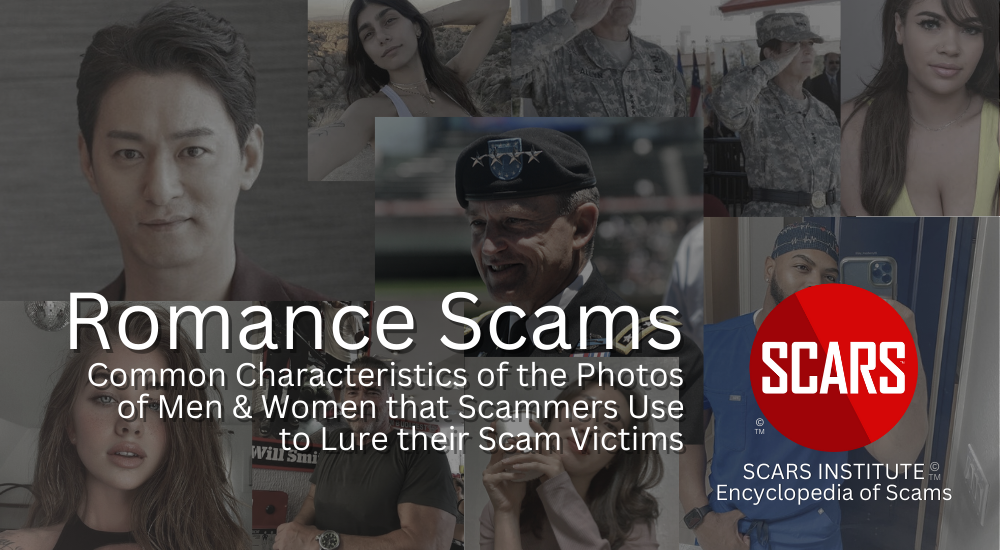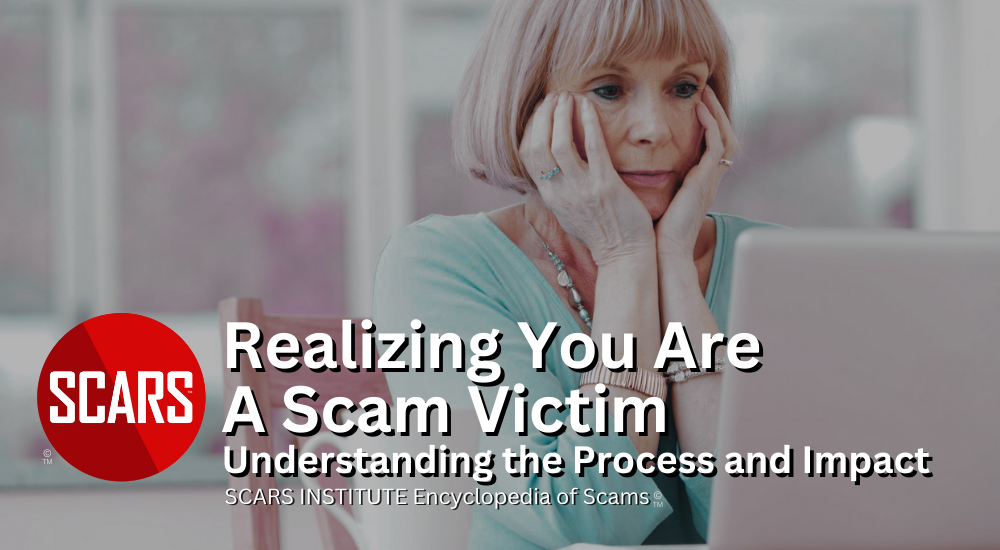
SCARS Institute’s Encyclopedia of Scams™ Published Continuously for 25 Years

Realizing You Are a Scam Victim
Understanding the Process and Impact
Scam Victimization – A SCARS Institute Insight
Author:
• Tim McGuinness, Ph.D., DFin, MCPO, MAnth – Anthropologist, Scientist, Director of the Society of Citizens Against Relationship Scams Inc.
Article Abstract
Realizing you’ve been scammed can trigger a mix of emotions like shock, anger, and shame. Scams are designed to exploit emotions and vulnerabilities, making even cautious individuals potential victims. Understanding how the scam occurred, whether through online, phone, romance, or investment schemes, is critical to recovery. Scammers use sophisticated tactics, often as part of organized networks, to manipulate victims by building trust and creating false crises.
The psychological impact of scam victimization can be severe, but it’s important to remember that it wasn’t the victim’s fault. Steps like stopping communication, reporting the scam, securing personal information, seeking emotional support, and educating oneself on scam tactics are essential for recovery and prevention. Sharing experiences later can also help protect others from similar scams.

Realizing You Are a Scam Victim: Understanding the Scam Victimization Process and Impact on Scam Victims
Introduction to Becoming a Scam Victim
The realization that you have been scammed is often accompanied by a mix of shock, disbelief, anger, and shame. Scams are intentionally designed to deceive, and even the most vigilant individuals can fall victim. Understanding the reasons behind the scam and how it occurred is essential for recovery. This understanding begins with a clear grasp of what just happened, how it happened, and why it happened.
Understanding the Scam
When someone realizes they have been scammed, especially in a relationship scam, it is crucial to recognize that the victim is not at fault. These scams are crafted to exploit emotions and vulnerabilities. Understanding this can be a significant step in alleviating feelings of guilt and shame, although emotional recovery is a gradual process.
Gaining insight into the mechanics of the scam is also vital. It empowers the victim to take the necessary steps, such as reporting the incident to authorities, cutting off all communication with the scammer, and securing personal information. Additionally, this understanding helps in identifying red flags in future interactions, although it is important to recognize that the risk of falling for scams may persist.
Moreover, sharing the experience can raise awareness and potentially protect others from similar deceptions, contributing to broader efforts to combat these fraudulent practices.
Recognizing the Impact of Scam Victimization
Discovering that you are a victim of financial fraud, often through a relationship scam, means that you have been deceived by organized criminals who exploited your trust to steal money, personal information, or other assets. These scammers are adept at manipulation, using various tactics to make their falsehoods believable.
In relationship scams, fraudsters typically create fake identities, presenting themselves as trustworthy individuals. They invest time in building a seemingly genuine connection, using persuasive communication to gain the victim’s trust and affection. Once this emotional bond is established, the scammer fabricates a crisis or urgent situation to elicit financial help. In investment scams, a fabricated obstacle prevents the victim from retrieving their money.
The psychological harm inflicted by these scams is profound. Victims experience trauma from the violation and betrayal, often leading to long-lasting emotional and psychological damage. It is important to understand that this manipulation was not the victim’s fault; it was a calculated act of psychological violence.
The Reasons Behind the Scam
Victims are not alone in this experience—millions worldwide have fallen prey to similar crimes. Scammers are part of organized networks that do not specifically target individuals but cast a wide net, looking for anyone who can be deceived.
The process begins with either the victim reaching out, as in the case of dating websites, or the scammer selecting the victim randomly. The initial contact might seem innocuous, but it sets the stage for grooming, where the scammer probes for information to identify and exploit vulnerabilities.
Scammers use sophisticated techniques to make their schemes appear legitimate, employing emotional manipulation and social engineering. They create fake websites, emails, and social media profiles that mimic real entities, making it easy for victims to be deceived.
How the Scam Occurred
The scam happened because of the scam victim’s vulnerabilities, which may be related to emotional and psychological factors such as loneliness, recent bereavement, or divorce. Scammers are highly skilled at identifying these vulnerabilities and exploiting them through tailored approaches.
Once a strong emotional connection is established, the scammer introduces fabricated crises or urgent financial needs, leveraging the victim’s emotional investment. The internet’s anonymity further facilitates these scams, allowing perpetrators to manipulate multiple victims simultaneously.
Examples of Common Scams
Online Scams: These include phishing emails, fake online stores, and social media scams that trick victims into providing personal information or making payments.
Romance Scams: Scammers create fake profiles on dating sites, build relationships with victims, and then ask for money, playing on emotions to make the scam seem genuine.
Investment Scams: Victims are promised high returns on investments that turn out to be fraudulent, with the scammers disappearing after receiving the money.
Phone Scams: Scammers pose as representatives from government agencies, tech support, or charities to obtain personal information or payments.
Sextortion Scams: Scammers lure victims into sending intimate photos, then blackmail them for money under the threat of releasing the images publicly.
Understanding the Scammers
Relationship scammers are often part of larger organized crime networks that use deception to exploit emotions and trust. These criminals can be located anywhere globally, often operating from regions with lax cybercrime laws. They are skilled manipulators who create convincing personas to exploit universal human desires for love, companionship, and connection.
These scammers justify their actions in various ways, often viewing their activities as a business or survival tactic. However, victims should remember that the criminals targeted them specifically because of their inherent goodness and capacity for trust.
Steps to Take After Realizing You’ve Been Scammed
- Cease All Communication: Immediately stop all communication with the scammer to prevent further manipulation and exploitation.
- Report the Scam: Report the incident to local law enforcement and relevant national bodies to help track and potentially apprehend the scammers.
- Secure Personal and Financial Information: Protect personal and financial information by changing passwords, alerting banks, and monitoring credit reports for unusual activity.
- Seek Emotional Support: The emotional impact of a scam can be significant, so it is important to seek support from trusted friends, family, and professional counseling.
- Educate Yourself: Learn about common scam tactics and the psychological methods used by scammers to better protect yourself in the future.
- Spread Awareness: Later, sharing your experience can help others recognize the signs of scams and avoid falling victim to similar schemes. However, focus on your recovery first.
Now What?
This was an introduction to help you understand some of the basics.
The next step is to visit www.ScamVictimsSupprot.org and learn the rest of the basics.
After that:
-
- Report the crime, and learn how at https://reporting.AgainstScams.org
- Sign up for support services at https://support.AgainstScams.org
- Find a trauma counselor at https://counseling.AgainstScams.org
If you have done all that:
-
- Enroll in our FREE SCARS Institute Scam Survivor’s School and learn EVERYTHING you need to know to stay safe, recover, and prevent it from happening again. Go to www.SCARSeducation.org
- No matter what you do, avoid listening to amateurs that can harm your recovery and mental well-being.
A Note About Labeling!
We often use the term ‘scam victim’ in our articles, but this is a convenience to help those searching for information in search engines like Google. It is just a convenience and has no deeper meaning. If you have come through such an experience, YOU are a Survivor! It was not your fault. You are not alone! Axios!
Statement About Victim Blaming
SCARS Institute articles examine different aspects of the scam victim experience, as well as those who may have been secondary victims. This work focuses on understanding victimization through the science of victimology, including common psychological and behavioral responses. The purpose is to help victims and survivors understand why these crimes occurred, reduce shame and self-blame, strengthen recovery programs and victim opportunities, and lower the risk of future victimization.
At times, these discussions may sound uncomfortable, overwhelming, or may be mistaken for blame. They are not. Scam victims are never blamed. Our goal is to explain the mechanisms of deception and the human responses that scammers exploit, and the processes that occur after the scam ends, so victims can better understand what happened to them and why it felt convincing at the time, and what the path looks like going forward.
Articles that address the psychology, neurology, physiology, and other characteristics of scams and the victim experience recognize that all people share cognitive and emotional traits that can be manipulated under the right conditions. These characteristics are not flaws. They are normal human functions that criminals deliberately exploit. Victims typically have little awareness of these mechanisms while a scam is unfolding and a very limited ability to control them. Awareness often comes only after the harm has occurred.
By explaining these processes, these articles help victims make sense of their experiences, understand common post-scam reactions, and identify ways to protect themselves moving forward. This knowledge supports recovery by replacing confusion and self-blame with clarity, context, and self-compassion.
Additional educational material on these topics is available at ScamPsychology.org – ScamsNOW.com and other SCARS Institute websites.
-/ 30 /-
What do you think about this?
Please share your thoughts in a comment below!
Table of Contents
LEAVE A COMMENT?
Recent Comments
On Other Articles
- Arwyn Lautenschlager on Love Bombing And How Romance Scam Victims Are Forced To Feel: “I was love bombed to the point that I would do just about anything for the scammer(s). I was told…” Feb 11, 14:24
- on Dani Daniels (Kira Lee Orsag): Another Scammer’s Favorite: “You provide a valuable service! I wish more people knew about it!” Feb 10, 15:05
- on Danielle Delaunay/Danielle Genevieve – Stolen Identity/Stolen Photos – Impersonation Victim UPDATED 2024: “We highly recommend that you simply turn away form the scam and scammers, and focus on the development of a…” Feb 4, 19:47
- on The Art Of Deception: The Fundamental Principals Of Successful Deceptions – 2024: “I experienced many of the deceptive tactics that romance scammers use. I was told various stories of hardship and why…” Feb 4, 15:27
- on Danielle Delaunay/Danielle Genevieve – Stolen Identity/Stolen Photos – Impersonation Victim UPDATED 2024: “Yes, I’m in that exact situation also. “Danielle” has seriously scammed me for 3 years now. “She” (he) doesn’t know…” Feb 4, 14:58
- on An Essay on Justice and Money Recovery – 2026: “you are so right I accidentally clicked on online justice I signed an agreement for 12k upfront but cd only…” Feb 3, 08:16
- on The SCARS Institute Top 50 Celebrity Impersonation Scams – 2025: “Quora has had visits from scammers pretending to be Keanu Reeves and Paul McCartney in 2025 and 2026.” Jan 27, 17:45
- on Scam Victims Should Limit Their Exposure To Scam News & Scammer Photos: “I used to look at scammers photos all the time; however, I don’t feel the need to do it anymore.…” Jan 26, 23:19
- on After A Scam, No One Can Tell You How You Will React: “This article was very informative, my scams happened 5 years ago; however, l do remember several of those emotions and/or…” Jan 23, 17:17
- on Situational Awareness and How Trauma Makes Scam Victims Less Safe – 2024: “I need to be more observant and I am practicing situational awareness. I’m saving this article to remind me of…” Jan 21, 22:55
ARTICLE META
Important Information for New Scam Victims
- Please visit www.ScamVictimsSupport.org – a SCARS Website for New Scam Victims & Sextortion Victims
- Enroll in FREE SCARS Scam Survivor’s School now at www.SCARSeducation.org
- Please visit www.ScamPsychology.org – to more fully understand the psychological concepts involved in scams and scam victim recovery
If you are looking for local trauma counselors please visit counseling.AgainstScams.org or join SCARS for our counseling/therapy benefit: membership.AgainstScams.org
If you need to speak with someone now, you can dial 988 or find phone numbers for crisis hotlines all around the world here: www.opencounseling.com/suicide-hotlines
A Note About Labeling!
We often use the term ‘scam victim’ in our articles, but this is a convenience to help those searching for information in search engines like Google. It is just a convenience and has no deeper meaning. If you have come through such an experience, YOU are a Survivor! It was not your fault. You are not alone! Axios!
A Question of Trust
At the SCARS Institute, we invite you to do your own research on the topics we speak about and publish, Our team investigates the subject being discussed, especially when it comes to understanding the scam victims-survivors experience. You can do Google searches but in many cases, you will have to wade through scientific papers and studies. However, remember that biases and perspectives matter and influence the outcome. Regardless, we encourage you to explore these topics as thoroughly as you can for your own awareness.
Statement About Victim Blaming
SCARS Institute articles examine different aspects of the scam victim experience, as well as those who may have been secondary victims. This work focuses on understanding victimization through the science of victimology, including common psychological and behavioral responses. The purpose is to help victims and survivors understand why these crimes occurred, reduce shame and self-blame, strengthen recovery programs and victim opportunities, and lower the risk of future victimization.
At times, these discussions may sound uncomfortable, overwhelming, or may be mistaken for blame. They are not. Scam victims are never blamed. Our goal is to explain the mechanisms of deception and the human responses that scammers exploit, and the processes that occur after the scam ends, so victims can better understand what happened to them and why it felt convincing at the time, and what the path looks like going forward.
Articles that address the psychology, neurology, physiology, and other characteristics of scams and the victim experience recognize that all people share cognitive and emotional traits that can be manipulated under the right conditions. These characteristics are not flaws. They are normal human functions that criminals deliberately exploit. Victims typically have little awareness of these mechanisms while a scam is unfolding and a very limited ability to control them. Awareness often comes only after the harm has occurred.
By explaining these processes, these articles help victims make sense of their experiences, understand common post-scam reactions, and identify ways to protect themselves moving forward. This knowledge supports recovery by replacing confusion and self-blame with clarity, context, and self-compassion.
Additional educational material on these topics is available at ScamPsychology.org – ScamsNOW.com and other SCARS Institute websites.
Psychology Disclaimer:
All articles about psychology and the human brain on this website are for information & education only
The information provided in this article is intended for educational and self-help purposes only and should not be construed as a substitute for professional therapy or counseling.
While any self-help techniques outlined herein may be beneficial for scam victims seeking to recover from their experience and move towards recovery, it is important to consult with a qualified mental health professional before initiating any course of action. Each individual’s experience and needs are unique, and what works for one person may not be suitable for another.
Additionally, any approach may not be appropriate for individuals with certain pre-existing mental health conditions or trauma histories. It is advisable to seek guidance from a licensed therapist or counselor who can provide personalized support, guidance, and treatment tailored to your specific needs.
If you are experiencing significant distress or emotional difficulties related to a scam or other traumatic event, please consult your doctor or mental health provider for appropriate care and support.
Also read our SCARS Institute Statement about Professional Care for Scam Victims – click here to go to our ScamsNOW.com website.
















Thank you for your comment. You may receive an email to follow up. We never share your data with marketers.